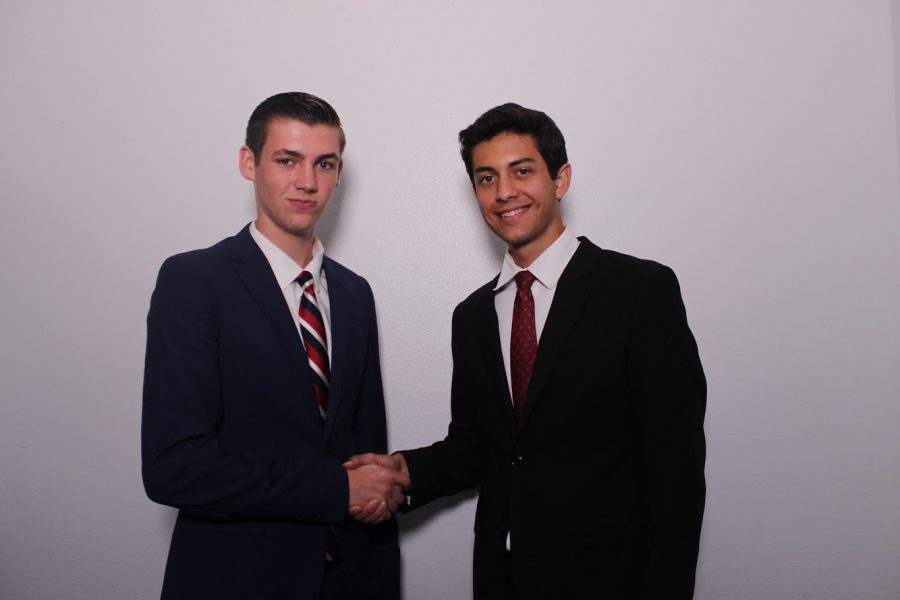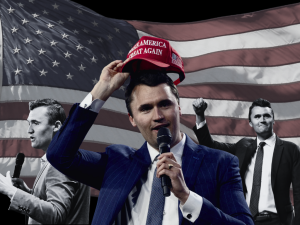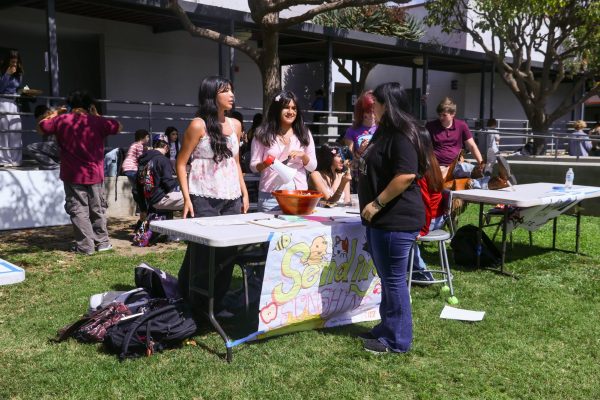BERNARD, INGRAM: A call for unity
Ben Bernard ’19 and Ian Ingram ’19 are Foothill students who submitted this column to our publication as guest writers. Read more about our policies on accepting student content on our ‘About’ page.
June 9, 2019
2019 is a day and age of an intense political climate. It seems nothing more exists than two opposing sides constantly at each other’s throat, both unyielding. But what is most important is that we remember why the two sides are disagreeing in the first place. When people hear the heavy political discourse, they often jump at the opportunity to prove the other person wrong, seemingly for satisfaction. However, this is not the goal or purpose of any political discussion. As part of the human race, we should all strive to seek the betterment of mankind as this should ultimately be the foundation for all political discourse. Disagreeing simply for the sake of disagreeing, or trying to win, accomplishes nothing and does not work towards this common goal that we should all uphold.
Recently, a group of Foothill students hosted a panel seeking to address the struggles of minority students. As a premise, there’s nothing wrong with getting a group of people together for the sake of discussion. We promote all forms of free speech. There’s also nothing wrong with the fact that this group consisted of minority students. Discrimination of any form is an act of evil that we should all stand against. However, when people gave their messages in the panel, there was a brash reaction from outsiders, both from conservatives and liberals. This incident parallels the general problem we see at large in American culture nowadays and it is for this reason that such a column should be written. We do not wish to bring more attention to this specific event. Rather, we wish to talk about the importance of unity amongst the political parties and shift peoples’ focus towards more moderate political mindsets.
Unfortunately, the behavior we see at large in today’s political arena, and even our own school, does not exemplify strides towards a positive future for all, only a select few. This behavior has a name: “identity politics,” and it’s far from unity. According to Google, identity politics can be defined as “a tendency for people of a particular religion, race, social background, etc., to form exclusive political alliances, moving away from traditional broad-based party politics.” By definition, this way of thinking creates disunity. Extremists of any kind, whether they be far-left or far-right, have been known to use this tactic to push an agenda. Identity politics does not help the greater good of humanity, rather it caters to a specific group of individuals and their needs. Another problem with identity politics is that once begun, it’s difficult to stop. This mindset and ideology require that you go through life constantly comparing the physical attributes or beliefs of others and yourself. If equality is the goal desired, how can it be achieved if there’s a self-perceived hierarchy of social groups? How can we achieve unison if our physical attributes determine where we fit in society? It is imperative that we as a society end this way of thinking. We need to shift our thoughts to building bridges because so much social damage has already been done.
What we must come to understand is that when somebody mentions a certain policy, they most likely have good intentions. But if we don’t agree with that certain policy, insulting a person’s character does not qualify as debate. Calling an opponent either a “fascist” or “libtard” will achieve nothing. Healthy debate means that both participants are open to having their minds changed through the use of facts and logic. And even though you have the right to use “inflammatory” language, it doesn’t mean you should. Most of all, we must monitor how we look at the world around us. We must put an end to politicizing absolutely everything.
President Lincoln once said, “A house divided against itself cannot stand.”And he was correct in his statements, for Lincoln recognized the necessity of political cooperation. The core foundation for peace begins with mutual respect for one another. And to achieve this level of respect, recognizing our universal interest in the improvement of human life is key. This is called the prime directive, the foundational respect for all human life. It’s especially easy to disregard others in the harsh world of politics. However, in everyday-life situations, such as in the classroom or the office, or even the household, understanding the value of opposing opinions is absolutely essential in cultivating a healthy society.
A large portion of society today has become an “outrage-culture.” Things are constantly banned due to a lack of “political correctness”. People boycott, get angry, attempt censorship, and even cause harm to others. This column is dedicated to the moderates and ex-moderates who are divided by all of this political insanity. We need to realize that although some radicals have stolen the spotlight, we make up the majority. We can take back the platforms that were stolen by the less rational. We can return things the way they were before this great big social mess by recognizing the importance of all political acceptance. As two graduating seniors, this is our message and vision for all future students and staff of Foothill to uphold. Thank you.













Mark Storer • Nov 22, 2019 at 4:27 pm
Another very impressive Op-Ed from the Dragon Press. I encourage my students on the Stinger staff at Camarillo High School to find ways to write about the world around them–and this is a fine example. Thanks, as always, for such superior content.
Michael Alesso • Jun 9, 2019 at 10:56 pm
Another great column! Well written. If only our elected officials could demonstrate the same understanding and restraint!
Young_guy123 • Jun 9, 2019 at 7:25 pm
Hey boys and girls I’m back again and might as well say my actual name is Liam Murphy from the graduating class of 2019 , I have to say this is the best article I’ve see on this website in a long time , topping these young men’s last endeavor. I can say for a lot of people that the world we live in now is filled to the absolute brink of politicization in the media, society, movies, tv and books. It seems everything has an agenda from both sides of the political spectrum. But because of this it causes people to be divided by political standings and its sickening to me. I’ve seen countless videos on the internet of people from both sides right and left verbally assaulting , harassing and even bringing violence into the picture. People choose to yell over each other in debates instead of bringing up their point of view simply and calmly with facts and logic. If you and your opposing individual can’t find common ground shake their hand with respect if they have sown you the same and walk away. It is that simple people , its not that hard of a concept to grasp. I’m glad someone has said it and put in down on the internet for a large number of people to see. Hopefully the people who read this have their minds and eyes opened to the world around us and realize that’s it is completely fine to have people that have different views and opinions that is what makes this country great and I’m sure we can all appreciate that. If you encounter someone you disagree with walk away tell them to have a nice day but if they are up for a friendly conversation/debate be respectful let them speak and have their time then you speak and if you change their views a but great but if you don’t it doesn’t matter shake their hand and tell them thanks and have a nice day. the world will go around much more smoother if this happens more often. If you see someone being harassed for something gender , race political ideology doesn’t matter if you are a trump supporter or a black guy or a hispanic woman , or an asian man or gay or lesbian or trans, be a good human being and help them out and diffuse the situation. Help out your fellow men and women. Hopefully the future is brighter if we can change these problems in our society.